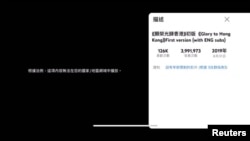YouTube says it will block access in Hong Kong to videos of performances of a banned protest song.
Hong Kong’s Court of Appeal ruled last week that “Glory to Hong Kong,” which emerged as an anthem for protesters during the massive anti-government protests in 2019, is illegal to sing or play in the city. The ruling said the song’s composer intended for the song to be used as a “weapon.”
There was no immediate comment from the government in Hong Kong.
The ban covers anyone who either broadcasts or distributes the song with the intention of promoting Hong Kong’s independence or misrepresents it as the city’s official anthem. Hong Kong is a semi-autonomous city.
YouTube said in a statement Wednesday that it will block access in the Chinese city to 32 videos of the song, which the court deemed was “prohibited content.”
"We are disappointed by the Court's decision but are complying with its removal order,” the online video sharing service said. The company said it shared concerns with human rights organizations about the chilling effect the ban would have on free speech online, and that it is considering options to file an appeal.
A search for the 32 videos in Hong Kong resulted in a message saying they were “not available on this country domain due to a court order.”
The song has mistakenly been played at sporting events as the official anthem of Hong Kong. The city does not have its own anthem, instead using mainland China’s official anthem “March of the Volunteers.”
The appeal court’s ruling overturned a previous decision issued last year by the High Court, which cited free speech concerns. The government went to court last year to have the song banned after Google and other internet service providers refused to remove it from their search results.
YouTube and Google are owned by California-based Alphabet.
The ban is the latest action taken by the government to silence dissenting voices since Beijing passed a sweeping security law for Hong Kong in 2020 in response to the protests. The law punishes anyone believed to be carrying out terrorism, separatism, subversion of state power or collusion with foreign forces.
Since the law took effect, hundreds of pro-democracy advocates have been arrested, tried and jailed, and the city’s once-vibrant civil society has been stifled.
George Chen, the co-chair of digital practice at the Washington-based business and policy consultancy Asia Group, said the ban could hurt Hong Kong’s reputation as a global financial hub if officials pressure online platforms on a daily basis to remove content, as it could raise questions about its willingness to allow the free flow of information.
Some information for this report came from The Associated Press, Reuters, Agence France-Presse.





